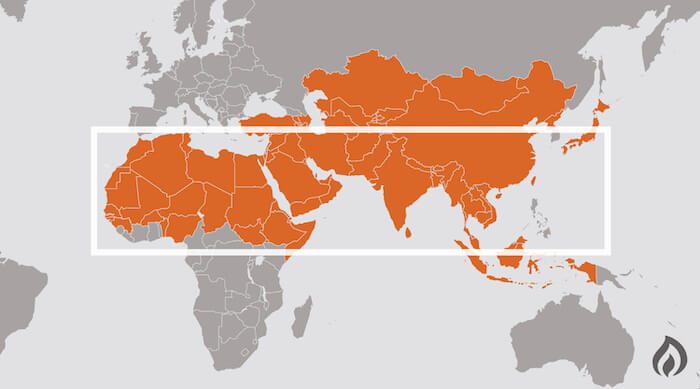
When Jesus gave the Great Commission, He was not only commanding that the gospel be preached in every country but to every people group in the world.

Christian missions organizations each have different areas of focus. Some are centered on humanitarian aid, such as delivering food to the hungry or providing medical care. Others mainly focus on taking the gospel to the lost and the broken. Of this second group, a handful, like East-West, place emphasis on taking the gospel to unreached people groups.
For those living in a country where Christianity is a norm, the term may be unfamiliar. But understanding unreached people groups is key to Christian missions and for ultimately fulfilling the Great Commission. So what are unreached people groups, and why are they important to missions?
In the U.S., a person would not have to travel far to find a church, a bookstore with a Bible, or a person who can explain the basics of the gospel. That is not the case in other areas of the world.
In some places, there are entire populations of people who have never seen a church, a Bible, or even heard the name of Jesus. These are unreached people groups.
An unreached people group, or UPG, is a society among which there is no established local community of believers. This small to nonexistent Church often also lacks the resources to evangelize their people group.
According to the Joshua Project, a people group is considered unreached based on the following criteria:
Of the approximately 8 billion people on planet Earth, about 3.2 billion are considered unreached or least reached. More than 7,000 people groups are classified as unreached. That’s more than 40% of the world’s population.
Within the more than 7,000 UPGs, 3,050 are considered unengaged unreached people groups. An unengaged unreached people group, or UUPG, is a people group with “no known active church planting underway.” UUPGs have likely never been reached by a believer.

Though people have responded to the Great Commission by taking the gospel to those who did not know Jesus since the first century A.D., the focus of reaching UPGs is fairly recent in mission history. Reaching unreached people groups was popularized after the founding of the U.S. Center for World Mission in 1976. Ralph and Roberta Winter, founders of the U.S. Center for World Mission (now Frontier Ventures), advocated for a focus on unreached people groups in missions, leading some missionaries and entire missions agencies to concentrate on UPGs.
Reaching the unreached is not just a missions strategy identified in the 1970s; it is biblical.
God desires for anybody—whether Jew or Gentile, rich or poor, young or old—to call upon His name. That is why in the Great Commission, Jesus commands His followers to “make disciples of all nations (Matthew 28:19).” Jesus yearns for all nations to know and proclaim His name.
Many define the word “nation” as an area or country with a formalized government and boundaries. But in Matthew 28, “nations” was translated from the word ethne, which is commonly understood to mean people groups or ethnic groups. When Jesus gave the Great Commission, He was not only commanding that the gospel be preached in every country but to every people group in the world.

When Jesus gave the Great Commission, He was not only commanding that the gospel be preached in every country but to every people group in the world.
Many Christians can take for granted the freedom they have to share the gospel with anyone they encounter. However, there are thousands of unreached people groups all over the world that have never heard of the name Jesus, much less have access to a Bible.
Believers have been entrusted to take the message of Jesus’ love to the nations, not just locally but in places where people cannot call on Him, they cannot depend on Him, and they cannot glorify Him because they do not know of Him.
“How, then, can they call on the one they have not believed in? And how can they believe in the one of whom they have not heard? And how can they hear without someone preaching to them? And how can anyone preach unless they are sent? As it is written: ‘How beautiful are the feet of those who bring good news!’” -Romans 10:14-15
Of the 3.2 billion people who are considered unreached, the vast majority (3.1 billion) reside in the 10/40 Window, aptly named for its location between 10 and 40 degrees north latitude, stretching across northern and Saharan Africa, the Middle East, and southern Asia. The world’s largest UPGs live within this window.
The term 10/40 Window was coined by Luis Bush, CEO of Partners International, as he was looking for a way to describe “an area of the world with great poverty and low quality of life, combined with a lack of access to Christian resources and unreached unbelievers.”
The 10/40 Window consists of many developing nations and the majority of the world’s followers of Islam, Hinduism, and Buddhism.
Of the 3.2 billion people who are considered unreached, the vast majority (3.1 billion) reside in the 10/40 Window.

The remainder of the world’s unreached are dispersed across the globe, many because of something called diaspora. Diaspora is the dispersion of any people from their original homeland. Millions of people around the world are fleeing their native countries for countless reasons, such as disease, persecution, and war, taking them to countries not known for UPGs.
For instance, UPGs are coming to the U.S. and North America in general looking for work, an education, or refuge from war torn nations. The largest UPGs in North America come from Africa, Asia, Europe, and the Middle East.
“We will only advance our evangelistic work as fast and as far as we advance on our knees.” -Alan Redpath
Having billions of people in the world who have never heard the name of Jesus is a God-sized problem that requires the hands of a God-sized Redeemer. Believers should pray for the unreached because God desires all peoples to be saved and because missions cannot happen without intercessory prayer.
Prayer is how hearts are changed—especially that of the one praying. So take some time to join in God’s work through praying for the unreached.
Knowing how to pray for the unreached can be a daunting task. You can narrow the focus by praying for specific UPGs or countries. Then, pray for those who do not yet know Jesus, missionaries, the global Church, and church leaders.
The status of UPGs worldwide will remain unchanged unless they are reached with the gospel. Join in God’s mission to reached the unreached by learning more about them, praying for them, and then going to share the gospel with them.
Believers should pray for the unreached because God desires all peoples to be saved and because missions cannot happen without intercessory prayer.
Join East-West in unifying the global Church to reach all people with the gospel.